Being able to skip classes improves some students' performance. Others struggle with more autonomy
- Written by Rigissa Megalokonomou, Lecturer in Economics, The University of Queensland
Remote learning online has been a common tool in the battle against COVID-19. School and university campus closures have affected over 1.5 billion learners in 165 countries. The reduced need for students to be in their physical classrooms gives them greater autonomy, with more choice about what they do with their time. Some might skip classes, but what impact does this have on their learning?
There is extensive evidence that missing classes has a negative impact on the performance of low-achieving students. But in our recently published study with Silvia Griselda of Bocconi University, we found higher-achieving students benefit from autonomy in the form of relaxed school attendance. These students increased their performance in high-stakes exams, improving their university placement and potentially, their careers.
Read more: How to maintain the balance between boundaries and freedom in secondary school parenting
A 2020 OECD report highlighted the unequal impacts of greater autonomy on students:
“Effective learning out of school has clearly placed greater demands on students’ autonomy, capacity for independent learning, executive functioning, self-monitoring and capacity to learn online. These are all essential skills for the present and the future. It is likely that some students were more proficient in them than others and that, as a result, were able to learn more than their peers while not in school.”
Why do student responses to autonomy matter?
Understanding the different ways in which students respond to autonomy can inform recovery strategies from pandemic-related learning losses and help predict their success. This knowledge can help ensure resources are allocated where they are most needed.
In Australia, each week of remote learning equates to a loss of about 25 hours of face-to-face compulsory instruction time at school. That’s equivalent to missing 2.5% of a year’s instruction time.
The effects of reduced in-person class attendance on student performance are complicated in Australia by the fact that, in an OECD survey, only 88% of students reported having a quiet place to study at home. This is lower than the OECD average (91%). For students in the bottom quarter for socioeconomic status, the gap is even wider – 78% in Australia to 85% for the OECD overall.
Read more: Schools are moving online, but not all children start out digitally equal
Research shows high-performing students may tend to better self-regulate their study. This means they can acquire more knowledge on their own.
Another study found high-performing students may be allocating their time across subjects and material more efficiently. Classroom-based instruction may offer less challenging material to these high-performing students, which means they might learn faster from remote learning projects and tasks tailored to their knowledge and ability.
 High-performing students appear to make better use of their time when they can choose to skip unproductive classes.
Shutterstock
High-performing students appear to make better use of their time when they can choose to skip unproductive classes.
Shutterstock
Read more: Gonski review attacks Australian schooling quality and urges individualised teaching approach
Learning from an innovative autonomy policy
There are lessons to be learned from policies that have previously provided students with increased autonomy. Our insights come from an innovative policy in Greece. Our study used data on more than 12,000 secondary school students in Greece across all high school grades over four years.
The Greek Ministry of Education provided higher-performing students with more autonomy. In particular, high performers were permitted to miss 30% more classes than before without penalty.
The rationale was that this would allow higher-performing students to make decisions on attending class that best served their own interests. So instead of attending class, they could, for example, use this time for self-study or leisure.
Read more: Educational waste: what's missing in Australian classrooms
To be classed as high-performing, students had to have an average grade above 75% in the previous year. The percentage of students characterised as high performers in maths and reading is almost the same in Australia and Greece, according to the results of the OECD’s Programme for International Student Assessment (PISA).
We found higher-performing students choose to miss more classes when allowed to distance themselves from school. This is in line with our previous research that showed high-achieving students take more absences during a pandemic.
Under the increased autonomy policy, these students improved their performance in national exams in high-stakes subjects. They also significantly increased their university admission scores. As a result, they were admitted to university degree programs of higher quality or selectiveness.
 Higher-performing students were more likely to choose to miss some classes but improved their results in national exams and university admissions.
Shutterstock
Higher-performing students were more likely to choose to miss some classes but improved their results in national exams and university admissions.
Shutterstock
Academic diversity of classes is another factor
We also found high-achieving students who were assigned to more academically diverse classrooms chose to distance themselves more from school.
Specifically, we looked at the effects on two groups of high-achieving students with previously similar grades – one group was in more academically diverse classrooms than the other. Even if they had identical grades in the previous year, these two groups ended up performing differently in the subsequent national exams and enrolled in post-secondary institutions of different quality. In particular, the group in the more academically diverse classes was more likely to distance themselves from school and improve their exam performance than the group in the less diverse classrooms.
A more diverse classroom is likely to be associated with lower in-class learning productivity and higher classroom disruption, which reduces the efficiency of instruction. There is evidence that teacher effectiveness drops in more academically diverse classrooms. Therefore, a more diverse classroom may be less conducive to learning for higher-performing students.
Read more: Why the curriculum should be based on students' readiness, not their age
Authors: Rigissa Megalokonomou, Lecturer in Economics, The University of Queensland





